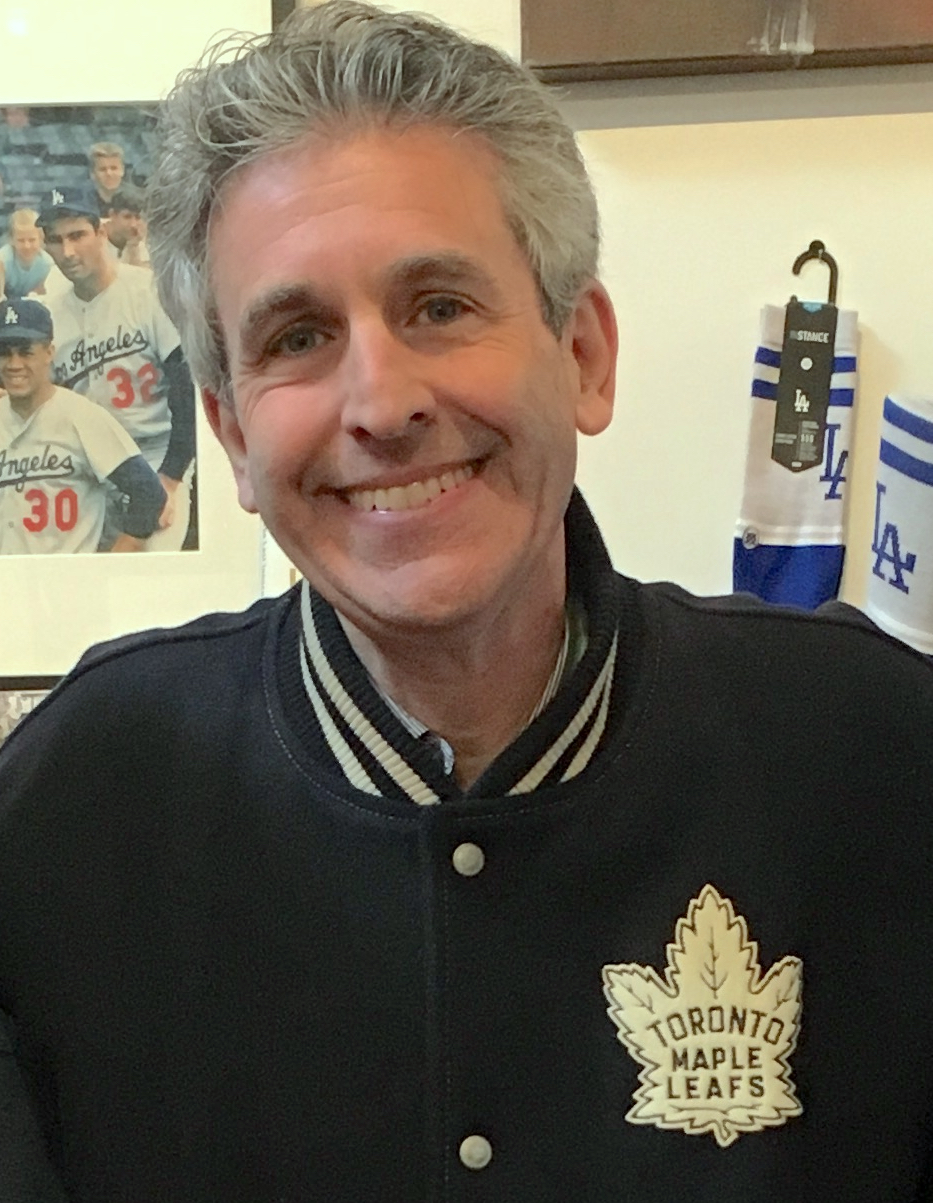Eric Zweig has written more than 40 books, fiction and nonfiction, about sports and sports history, for adults and children, as well as articles for The New York Times and many Canadian newspapers. He has also been a writer/producer/researcher with organizations ranging from the Hockey Hall of Fame to ESPN: the Magazine, and a frequent sports-history guest on television and radio.
A sports fanatic from the age of ten, he’s the eldest of three boys in a sports-loving family who grew up enjoying baseball, football, hockey, skiing and water skiing.
In elementary school, when asked for current-events assignments, he turned in game reports instead. While a student at Trent University in Ontario, he discovered old newspapers on microfilm in the basement library and began looking up old sports stories – a moment he credits with realizing his life’s focus.
After graduating with a degree in political science, Eric wrote a historical novel set in the early days of professional hockey – and has spent the rest of his career writing and researching sports. He has a particular passion for digging up quirky aspects of sports history and compiling facts and figures in an entertaining way.
His books include The Big Book of Hockey for Kids, the Hockey Trivia for Kids series, and several sports-quotes books.
He’s a member of the Society for International Hockey Research and the Society for American Baseball Research and worked with the consulting publisher to the National Hockey League for 22 years. The Society for International Hockey Research awarded him the Brian McFarlane Award in 2005 and the Paul Kitchen Award in 2016.
He currently lives in Owen Sound, Ontario, Canada with a cat named Odie (named after old-time hockey star Odie Cleghorn). He can be found at http://ericzweig.com/, https://authorsbooking.com/ and @AuthorsBooking.
Q: You’ve said that as a boy, you felt that school just wasn’t as much fun as sports, and you were always being told you needed to work harder. What message do you have for kids who can relate to that?
A: The truth is – though I may have ended up in the exact same place as I am today – I wish I had actually worked harder in school. Then again, I don’t think I’d trade the fun I had with my friends doing the things we did when we should have been working harder! I wasn’t a bad kid, nor was I a bad student, but I don’t think teachers in my day spent enough time trying to engage kids who were more difficult to engage. I hope they do today, but I don’t know how many actually do.
Q: If educators and parents often undervalue sports books, how do you persuade them to give this genre more credit?
A: It’s funny. I often feel like sportswriters look down on me because so much of what I write is for kids, and the children’s authors look down on me because I write about sports! But so many teachers and parents have told me that their kids (mostly boys, but girls too) who don’t like to read love reading my books. It’s not something I ever specifically set out to do, but I do like to hear that. I’ve never actually set out to persuade anyone that these kinds of books deserve more attention or credit. Maybe I should. It’s funny that while on the one hand, I’m a big ham who is very happy to talk about what I do, on the other hand, I’m still not very good at promoting myself or my genre!
Q: What draws kids to trivia and facts books, and are they useful as a springboard to other types of reading? Also, what kind of child is drawn to them in particular?
A: As a young boy, even though I didn’t like school, I always liked to read. And I guess I liked to know things, too. I hear from people all the time about how their children (and, increasingly, grandchildren!) love sports and stats and facts. But, honestly, I don’t really know what the draw is! I just know that I did too, and that I mostly write about the kinds of things I would have liked to read about. It does seem to draw more boys than girls, but I couldn’t really say what kind of children are drawn to them. It seems like a wide range to me of kids that are good in school and kids that aren’t; kids that are athletic and kids that aren’t. As I said, I always liked to know things, and have a hard time imagining a kid (or a grownup) who doesn’t…
Q: Why is it important to preserve and help youth engage with sports history?
A: There are a lot of people who say sports can be racist and misogynistic. And they can be. And they probably used to be worse. But so was so much about our society. I don’t know if it’s any more important to preserve and engage with sports history than it is with any aspect of history.
The more you know about how things used to be, the more you can see how they’ve changed. And where they still need to get to. Admittedly, my writing probably doesn’t do a lot of that. I’ve been sort of more focused on, “the more things change, the more they stay the same.” You know, like, “You think Auston Matthew or Connor McDavid is great, well, let me tell you about Charlie Conacher or Wayne Gretzky.” But, hopefully, if enough people start to realize that history isn’t just boring old stuff, the more they will appreciate how and why some things change … and some things still need to change.
Q: As someone immersed in sports both today and yesterday, can you offer observations on trends? Regarding inclusiveness, safety, coaching styles, diversity…
A: Hockey, specifically, likes to say that it’s for everybody. We’ll probably never see a woman play in the NHL, but more and more women are getting jobs in hockey. And, maybe, someday soon, there will be a league where a woman might actually be able to earn a living playing hockey if they’re good enough.
As for racism in hockey, I’m appalled whenever I hear stories about how hard it is for hockey players of color. I guess it’s better than it used to be, but it’s hard for me to believe it’s still as big an issue as it appears to be.
As for safety, I think sports like hockey and football have done so much to improve the equipment that the game is much safer that way … although they are still very rough games.
In the old days, professional coaches were almost exclusively old players who wanted to stay in the game. These days, coaches are better educated and, really, can come from any sort of background. They are better trained in how to teach their athletes rather than just trying to boss them around. On the other hand, kids from a very young age are taught the “systems” of how to play. There doesn’t seem to be as much just getting out there and having fun. Also, athletes in the old days used to play a lot of different sports. Wayne Gretzky always talks about how much he loved baseball, and how much he learned about playing hockey by playing lacrosse. Most of us aren’t going to be Wayne Gretzky. Most of us aren’t going to ever play in the NHL, or pro football or baseball. So, I think it’s important that the men and women who are coaching children remember that sports are supposed to be fun!
Q: What are you working on at the moment?
A: I recently finished the fifth title in the Hockey Trivia for Kids series, and it will be out in the fall of 2022. There are plans for a sixth book within the next year or two, so I’m always collecting stories from whatever is going on! I have a new book for adults about the Kenora Thistles – the team from the smallest town ever to win the Stanley Cup – that will be coming out in the spring of 2022, and another book for adults coming out in the fall as well. Right now, I’m working on a completely different type of book … but it’ll probably be a long time before we know if anything will come of that!

